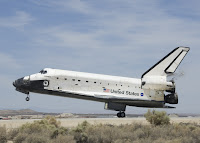With Atlantis poised to leave Earth one last time, signaling an end to more than 30 years of flying the Shuttle Orbiter, some of the nation's best-known astronauts are speaking out about NASA retiring its reusable spacecraft, and what it might mean to the future of manned space flight.
At a June gathering of astronauts during SpaceFest III held at the Starr Pass Resort in Tucson, Atlantis' final launch on Friday sparked strong opinions from nearly a dozen Apollo and shuttle astronauts.
Apollo 7 astronaut retired Marine Col. Walter Cunningham, 79, Houston, Texas
"They aren't moth-balling the shuttle, they've quit it. They've stopped it. It's the worst decision ever made by NASA, to ground the shuttle, without a replacement. And a replacement would be very difficult because this is the greatest flying machine ever developed and built; it's the safest spacecraft that we have ever flown into orbit. It's really bad for NASA, but more importantly, it's terrible for our country. Because right now, it's doing away with the kind of imagination and dreaming that it takes to reach out and explore. And when you can't be the preeminent space nation in the world, you're surrendering things. I'm much more concerned about it's impact on the country than I am just it's impact on NASA.
"We better hope that the so-called space industry is successful, because it's the only thing we're going to have going for us. And there's no question that a commercial company can cut through some of the delays and cost, because they're not big and bureaucratic yet. So, it might be a little bit cheaper, but it's going to be a hell of a lot more expensive than they think, and it's going to take a lot longer than they think before they can have any kind of man-rated vehicle flying."
Cunningham was selected by NASA to train as an astronaut in 1963. On Oct. 11, 1968, he served as lunar module pilot for the Apollo 7 mission, along with spacecraft commander Walter M. Schirra, Jr., and command module pilot Donn F. Eisele. The 11-day flight was the first manned flight test of the third generation U.S. spacecraft. Cunningham was also the backup lunar module pilot to the crew of Apollo 1. When the Apollo 1 spacecraft burned up on the pad, killing the entire crew, Cunningham, Schirra, and Eisele were assigned to fly the first manned Apollo mission. After retiring from NASA in 1971, Cunningham wrote "The All-American Boys: the human side of the space program," released in 1977.
Apollo 10 astronaut retired Air Force Lt. Gen. Thomas P. Stafford, 80, Florida
"I explained to a lot of congressmen that one time I had a chance to one-on-one with (President) Richard Nixon, and I told him this was the thing to do to go forward. At times we were very small in the astronaut group, (NASA director of Flight Crew Operations and astronaut) Deke Slayton, myself and (Apollo 13 command module pilot John) Jack Swigert. We did a lot of the landing and approach testing and simulating."
Of the last shuttle flight, Stafford said: "I think it's a little short sighted. Sure we needed to look at this as a result of the Columbia accident; they recommended you have the crew separate from the cargo, after the Columbia accident. But also, they're still doing a great job . . . we need to move on and continue. America has led human space flight starting with the Gemini program, while the Soviet Union led before that. It turns out we set the lead with Gemini, and now we're falling back."
READ THE REST OF THE STORY HERE




No comments:
Post a Comment
Your comments are welcome - just remember this is a family blog so keep it clean.